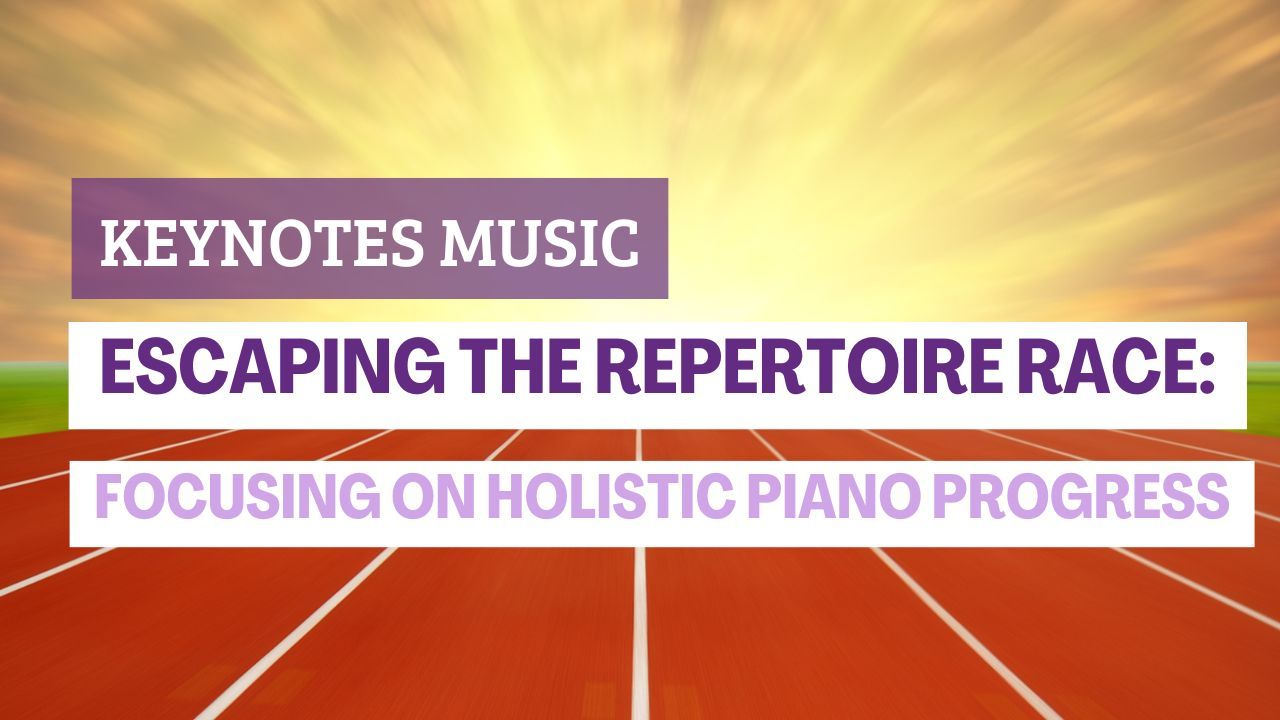Escaping the Repertoire Race: Focusing on Holistic Piano Progress
Jan 20, 2025
What is progress in piano? And how is it measured? All too often, progress is equated with the number of pieces a student has learned to play or the accomplishment of finishing a method book. But what does "finishing a book" truly mean? Did the student develop the skills and concepts embedded in the repertoire, or did they simply play through the pieces to move on to the next level? This mindset turns learning into a repertoire race, where the finish line is marked by the quantity of completed pieces or books. While this approach may seem logical, it overlooks the deeper, more meaningful aspects of musical development. Progress isn’t just about how many pieces a student can perform; it’s about the skills, concepts, and understanding they gain along the way.
This perspective is especially vital in group piano settings, where students progress at different rates and in varied ways. If progress is repertoire and method-book-page-based, students would have to learn different pieces to each other in order to progress individually, but then they would no longer be learning and playing together. By shifting the focus from repertoire to competencies, we can create a more inclusive and enriching learning environment. In this post, we’ll explore why the repertoire race mentality is problematic, discuss the benefits of a competency-based approach, and offer practical strategies for implementation.
The Problem with the Repertoire Race
A repertoire-focused mindset tends to:
- Prioritize Quantity Over Quality: Students may rush through pieces without truly mastering them, leading to gaps in technique and understanding.
- Foster Unhealthy Comparisons: In lab-style group settings, students may compare their repertoire lists, creating feelings of inadequacy or competition.
- Neglect Skill Development: Essential skills such as sight-reading, improvisation, and musicality can be overshadowed by the pressure to complete pieces.
- Fail to Foster Independence: With repertoire progress as the sole focus, students miss out on developing broader skills. The lack of emphasis on theory, technique, and creative exploration leaves them reliant on specific pieces rather than becoming well-rounded, independent musicians.
Instead, we should celebrate what students truly know and understand, how they play, and the depth of their technique and skills.
The Holistic Approach: Focusing on Skills and Concepts
A competency-based approach shifts the focus to:
- Mastering Skills: Celebrating achievements in areas like finger strength, articulation, and rhythm.
- Deepening Understanding: Ensuring students grasp theoretical concepts such as harmony, scales, and dynamics.
- Encouraging Creativity: Incorporating activities like composition and improvisation to develop well-rounded musicianship.
- Individualized Progress: Allowing students to work on the same skills and concepts at different depths and rates, fostering inclusivity in group settings.
Practical Strategies for Group Classes
-
Use Progress Ladders
Competency-based progress ladders, like those provided by KeyNotes Music, give teachers a clear framework for tracking student development. These ladders outline essential skills and concepts, ensuring that every student’s progress is measured holistically. -
Scaffold Skills and Concepts
Scaffolding helps break down skills into manageable steps, enabling students to build confidence and mastery incrementally. For example:- Start with basic hand positioning before introducing complex finger independence exercises.
- Introduce simple rhythmic patterns before progressing to syncopated or compound rhythms.
-
Celebrate Individual Achievements
In group settings, highlight each student’s unique progress. Instead of comparing repertoire lists, celebrate milestones like improved posture, confident improvisation, or mastery of a tricky rhythm. -
Integrate Group Activities
Incorporate ensemble playing, group improvisation, and theory games that allow students to develop collaborative skills while reinforcing individual competencies. -
Encourage Reflection
Have students reflect on their progress by identifying skills they’ve improved and areas they’d like to focus on. This promotes self-awareness and a growth mindset. -
Allow for Adaptations to Repertoire
You may be wondering what happens when a student masters a piece before others in their class? It's all very well thinking about the skills and concepts, but what about the practical application of those through playing? If the pieces being learnt have the ability to adapt and evolve along with the students' skills, you can keep everyone on the same piece together. So instead of moving to a different piece when they progress, they add depth and difficulty to the piece they're on. Every piece that students learn within the KeyNotes programs has these challenges built in to allow for this.
Why This Matters
Shifting the focus from repertoire to holistic progress ensures that students become not only better players but also better musicians. They learn to appreciate the nuances of music, develop transferable skills, and build confidence in their abilities. In a group setting, this approach fosters a supportive, collaborative environment where every student can thrive at their own pace.
One other factor to consider, is the perennial problem of the transition student. This problem is so evident within piano-teaching forums and it exists because of this linear progress-by-repertoire approach. If students were learning the foundations as skills and concepts, rather than simply learning to play songs that are gradually progressive, would this problem cease to exist?
Conclusion
It’s time to escape the repertoire race and redefine progress in piano learning. By focusing on skills, concepts, and individual growth, we can create a richer, more meaningful experience for our students. With tools like KeyNotes Music’s progress ladders and a commitment to scaffolding and reflection, teachers can transform group classes into vibrant, learner-centered communities.
Let’s celebrate the journey, not just the destination. After all, true progress isn’t about how many pieces a student can play—it’s about how they can apply skills and information in piano playing.
Want to learn more about the
KeyNotes Music program?
Download our teacher information brochure to discover what our license includes, which programs we offer and what our approaches to learning are:
We will send you emails from KeyNotes Music, unsubscribe at any time.

